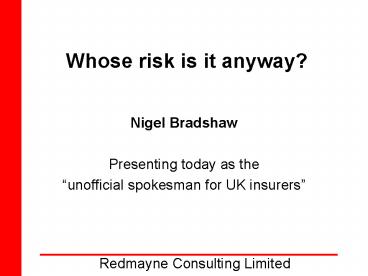Whose risk is it anyway - PowerPoint PPT Presentation
1 / 14
Title:
Whose risk is it anyway
Description:
... cost of addiction. Insurers are ... Addiction is hard to kick ... They must help the addict see why change is necessary. They must help with the 'cold turkey' ... – PowerPoint PPT presentation
Number of Views:63
Avg rating:3.0/5.0
Title: Whose risk is it anyway
1
Whose risk is it anyway?
- Nigel Bradshaw
- Presenting today as the
- unofficial spokesman for UK insurers
2
Historical perspective
New ideas benefits
High margins on business
Large risks
Contingent resource
Technical expertise
3
The late 90s
- Saw reassurers get commercially aware
- The bright insurers said thank you very much
- It was addictive
4
The cost of addiction
- Insurers are good at some things
- If reassurers want to compete on price why stop
them? - If reassurers accept minimal data why stop them?
- If reassurers accept persistency and other risks
why stop them? - If reassurers want to throw cheap capital at me
why stop them?
- Insurers are bad at other things
- Churning business was to generate top-line sales
growth, not to rip off reassurers - Underwriting standards fell due to expense
pressures, not to rip off reassurers - Administration was poor due to take-overs, Y2K
and other distractions, not to rip off reassurers
5
Addiction is hard to kick
- Why build own risk management when reassurers
insist that you follow their standards anyway? - Take underwriting as an example
- Reassurers have not helped recently
- Insurers are not able to go back to the old days
6
Addicts do bad things
- I am not defending the worse excesses of rogue
insurers
Waiving loadings
Quarterly auctions
Spurious division of portfolio
Inadequate claims management
Late notification of changes
Writing business the insurer would not touch
But do heroin suppliers not expect their
customers to steal to fund their habit?
7
Reassurers need to lead any change
- They must help the addict see why change is
necessary - They must help with the cold turkey
- They must offer an attractive vision of the
future - Do reassurers want to be seen as the future?
8
Necessary changes for reassurers (1)
- Define the risk fairly
- Neither side can be trusted in future
- Clear, unambiguous treaty wording is needed
- Issues
- Currently reassurers are weighting treaties too
much in their favour - Many insurers have not got the necessary skills
- Insurers have not historically priced for some of
their new risks
9
Necessary changes for reassurers (2)
- Either hand over the underwriting pen or not
- Currently insurers feel that they are caught
twice - Insurers do process lots of business and need
delegated authority - Alternatively just underwrite at point of claim
- Issues
- Insurers need consistency
- How are error targets defined
10
Necessary changes for reassurers (3)
- Reassurers must share in the social change risk
- Insurers do not expect reassurers to bear
mis-selling costs - But do expect reassurers to follow other
interpretations of insurance law and practice - Issues
- Insurers must make all available documentation
available - Reassurers need to spread these risks across
countries - Reassurers who refuse early claims reduce real
claims
11
Necessary changes for reassurers (4)
- Reassurers must connect with insurers again
- Distributors / Insurers / Reassurers all together
- For example on reviewability
- Issues
- Insurers are driven by customers and distributors
- and reassurers must work with them to be part of
the solution - while insurers need to educate and lead customers
and distributors
12
Necessary changes for reassurers (5)
- Reassurers must develop little sticks and fair
resolutions - Proportionate penalties, plus
- a fair resolution process should the treaty fail
- Issues
- Penalties should encourage good behaviour and
compensate for loss - How can a fair change resolution process work in
a climate of mistrust?
13
A historical review from 2050
- Insurance changed at the start of the 21st
century - Insurers learnt to outsource more and better
- Some reassurers became pure insurance risk
providers - Other reassurers complemented insurers through a
wider range of risk diversification
14
Whose risk is it anyway?
- Nigel Bradshaw
- Questions?































